2022年中考英语动词复习课件(64张)
文档属性
| 名称 | 2022年中考英语动词复习课件(64张) | 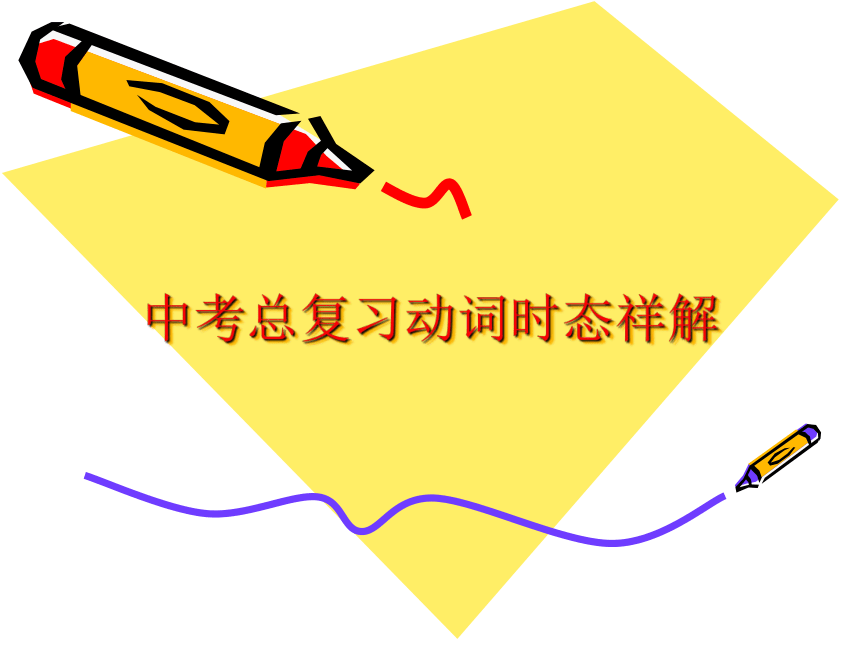 | |
| 格式 | pptx | ||
| 文件大小 | 478.8KB | ||
| 资源类型 | 教案 | ||
| 版本资源 | 通用版 | ||
| 科目 | 英语 | ||
| 更新时间 | 2022-04-27 19:11:04 | ||
图片预览



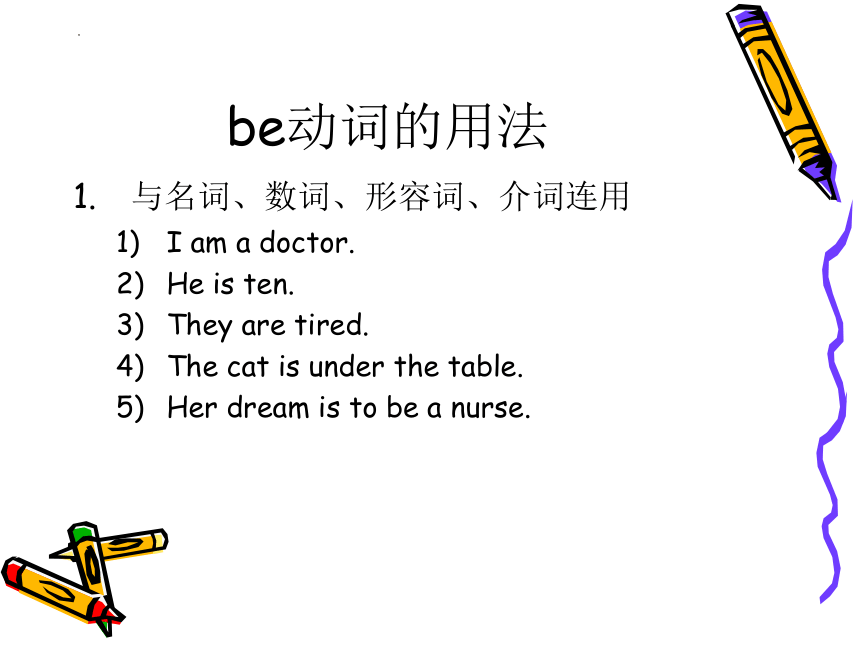
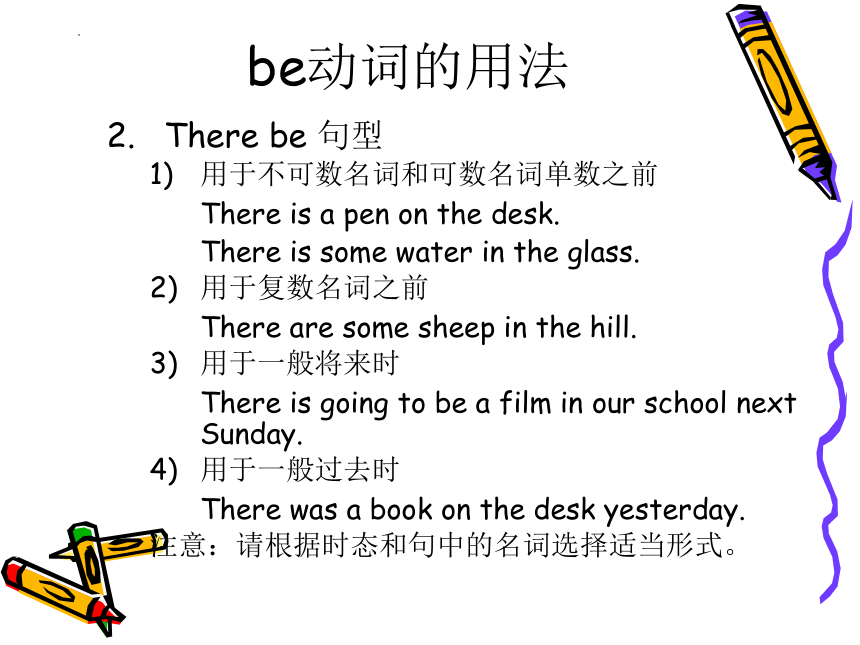
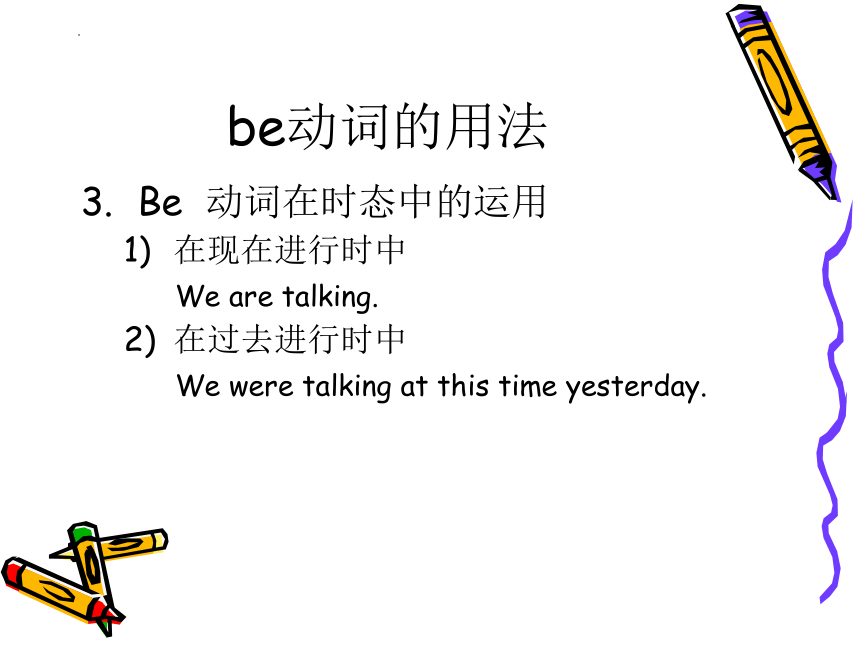
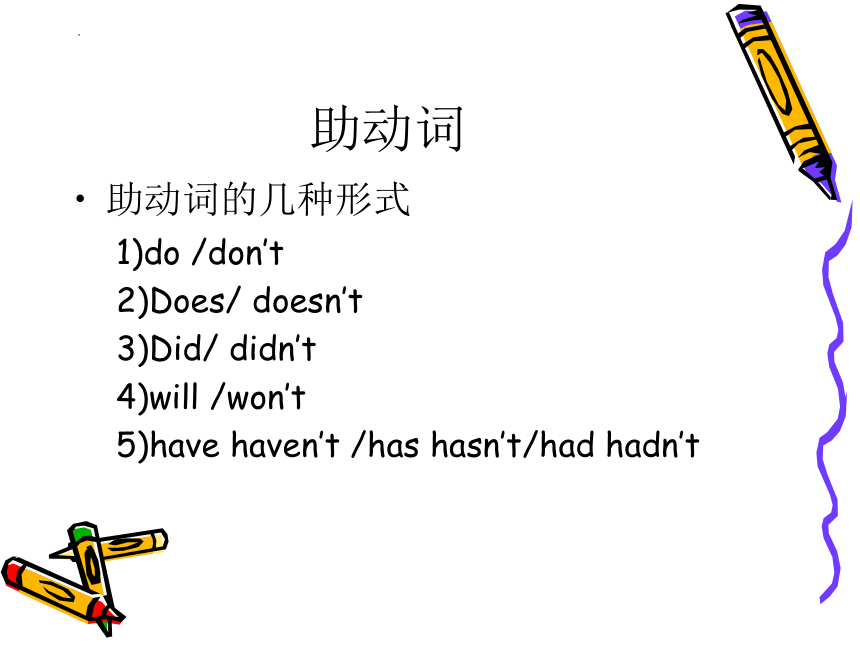

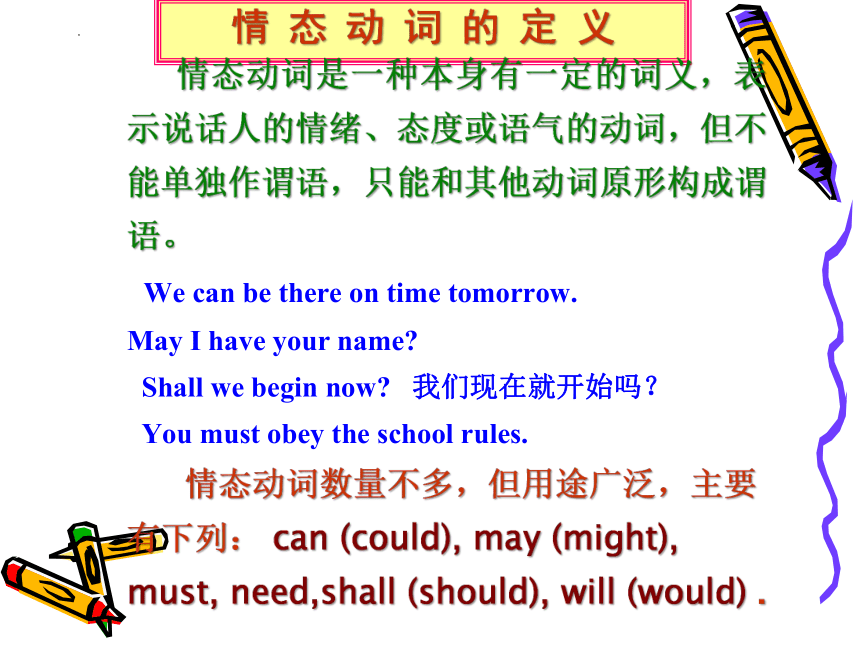

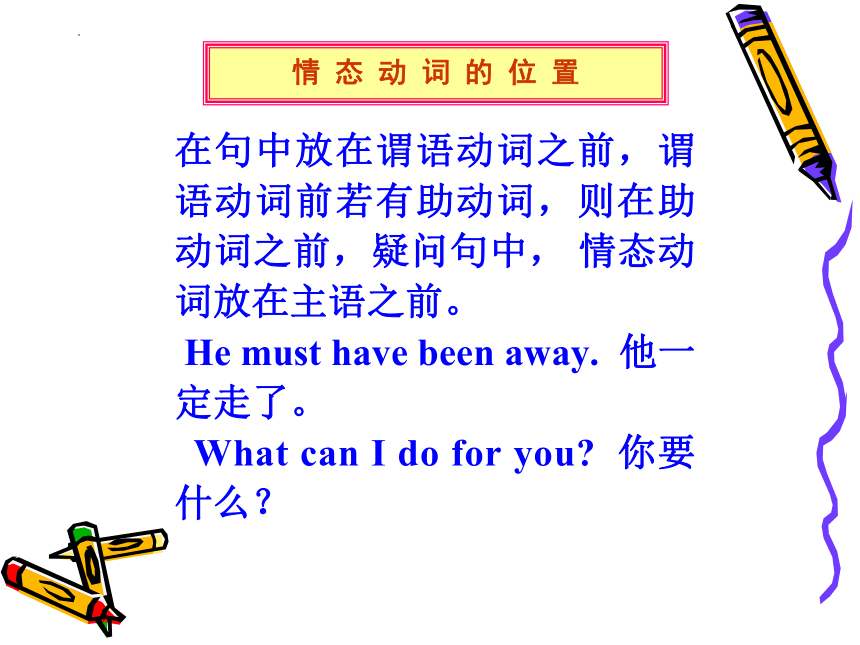
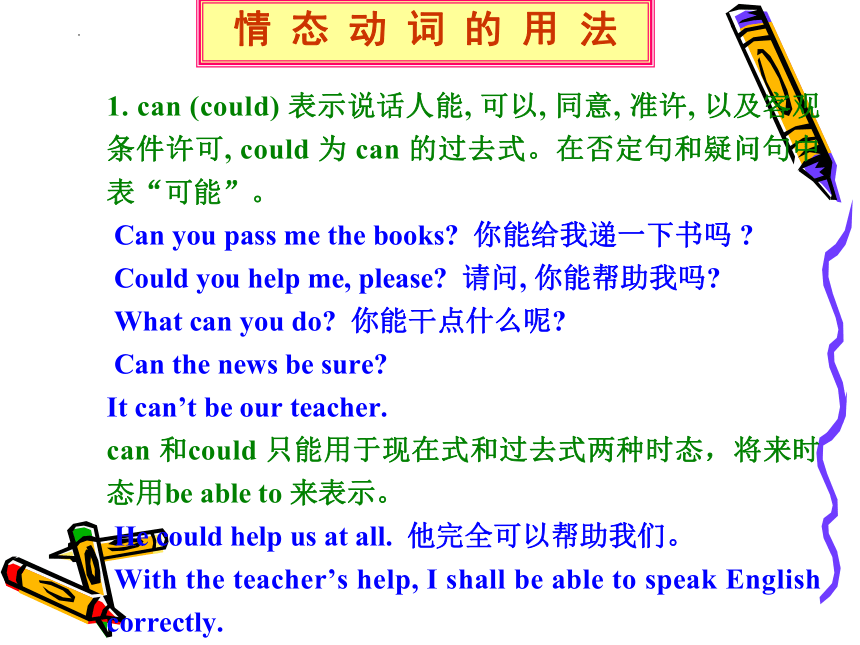
文档简介
(共64张PPT)
中考总复习动词时态祥解
动词的构成
be 动词
助动词
情态动词
系动词
实义动词
be 动词
be动词的几种形式
am is are
was were
being
Been
be动词的用法
与名词、数词、形容词、介词连用
I am a doctor.
He is ten.
They are tired.
The cat is under the table.
Her dream is to be a nurse.
be动词的用法
There be 句型
用于不可数名词和可数名词单数之前
There is a pen on the desk.
There is some water in the glass.
用于复数名词之前
There are some sheep in the hill.
用于一般将来时
There is going to be a film in our school next Sunday.
用于一般过去时
There was a book on the desk yesterday.
注意:请根据时态和句中的名词选择适当形式。
be动词的用法
Be 动词在时态中的运用
在现在进行时中
We are talking.
在过去进行时中
We were talking at this time yesterday.
助动词
助动词的几种形式
do /don’t
Does/ doesn’t
Did/ didn’t
will /won’t
have haven’t /has hasn’t/had hadn’t
助动词的用法
对句子进行否定和疑问
Do you get up early every day
I didn’t have lunch yesterday.
Will you be back soon
He hasn’t finished the work yet.
在反意疑问句中
He works in a school,doesn’t he
She has never been there,has she
在倒装句中
They helped the farmers , so did we.
I won’t visit the famous singer,neither will he.
情 态 动 词 的 定 义
情态动词是一种本身有一定的词义,表示说话人的情绪、态度或语气的动词,但不能单独作谓语,只能和其他动词原形构成谓语。
We can be there on time tomorrow.
May I have your name
Shall we begin now 我们现在就开始吗?
You must obey the school rules.
情态动词数量不多,但用途广泛,主要有下列: can (could), may (might), must, need,shall (should), will (would) .
情态动词
共同特点
情态动词后面跟动词原型
无论否定、疑问、倒装句、或反意疑问句都用情态动词
只有时态变化,没有人称变化
否定式构成是在情态动词后面加“not”。个别情态动词有现在式和过去式两种形式,过去式可以用来表达更加客气、委婉的语气,时态性不强,可用于过去,现在或将来。
He could be here soon. 他很快就来。
We can't carry the heavy box. 我们搬不动那箱子。
I'm sorry I can't help you. 对不起,我帮不上你
情 态 动 词 的 位 置
在句中放在谓语动词之前,谓语动词前若有助动词,则在助动词之前,疑问句中, 情态动词放在主语之前。
He must have been away. 他一定走了。
What can I do for you 你要什么?
情 态 动 词 的 用 法
1. can (could) 表示说话人能, 可以, 同意, 准许, 以及客观条件许可, could 为 can 的过去式。在否定句和疑问句中表“可能”。
Can you pass me the books 你能给我递一下书吗
Could you help me, please 请问, 你能帮助我吗
What can you do 你能干点什么呢
Can the news be sure
It can’t be our teacher.
can 和could 只能用于现在式和过去式两种时态,将来时态用be able to 来表示。
He could help us at all. 他完全可以帮助我们。
With the teacher’s help, I shall be able to speak English correctly.
2. may (might) “可以”,表示说话人同意,许可或请求对方许可。
You may take the book home. 你可以把书带回家去。
May I come in 我可以进来吗
May I use your dictionary 我可以用你的词典吗
You may put on more clothes. 你可以多穿点衣服。
He said he might lend us some money.
may 否定式为 may not, 缩写形式是 mayn’t。might 是may 的过去式,有两种用法,一种表示过去式,一种表示虚拟语气,使语气更加委婉、 客气或对可能性的怀疑。
He told me he might be here on time. 他说他能按时间来。
Might I borrow some money now 我可以借点钱吗
He might be alive. 他可能还活着。
对引出的疑问句,回答方式有:
1.Yes ,of course.
2.Yes , certainly.
3. Sure .
4.No , you mustn’t.
5.No ,you can’t.
3. must “必须;应该;一定;准是”,表示说话人认为有必要做某事,命令、要求别人做某事以及对事物的推测。must 用来指一般现在时和一般将来时, 过去式可用 have to 的过去式代替。对must引导的疑问句,肯定用must,否定用needn’t或don’t have to来回答。
I must finish my work today. You mustn't work all the time. Must I return the book tomorrow After such a long walk, you must be tired. 。
He must be the man I am looking for.
值得注意的是:
(1)must + have + 过去分词,表示现在对过去事物的推测。
He must have told my parents about it.
He must have received my letter now.
(2)must 和 have to 的区别: must 表示说话人的主观思想, have to “不得不,必须”,表示客观需要、客观条件只能如此。
You must do it now. 你必需现在就干。(说话人认为必须现在干)
I have to go now. 我得走了。(客观条件必须现在走)
You must be here on time next time. 你下次一定要按时来。I have to cook for my child. 我得给孩子做饭。
4. need “需要”,多用在否定式或疑问句中. 肯定句用must,否定句用needn’t来回答。
Need I attend the meeting tomorrow You need not hand in the paper this week.
need 是一个情态动词,他的用法完全和其他情态动词一样,但 need 还可当作实义动词使用,这时 need 就象其他动词一样,有第三人称,单复数, 后面加带 to 的动词等特性。
I need a bike to go to school. 我上学需要一辆自行车。
She needs a necklace. 她需要一条项链。
注意:“needn‘t + have + 过去分词” 表示过去做了没必要做的事情。
You needn't have taken it seriously. 这件事情你不必太认真。
5. will (would) 表决心、愿望。 would 为 will 的过去式, 可用于各人称。
I'll do my best to catch up with them. 我要尽全力赶上他们。
I'll never do it again, that's the last time. 我再不会做那件事情了,这是最后一次。
He said he would help me. 他说他会帮助我。
will, would用于疑问句表示说话人向对方提出请求或询问,用 would 比 will 更婉转,客气。
It's hot. Will you open the windows
Would you like some coffee?
对will/would you… 的回答方式有:
Yes ,I will./ No , I won’t.
Sure ./(I’m sorry , I can’t.
All right.
Certainly . / No, thank you.
Yes , please.
6. shall, should 表示命令, 警告, 允诺, 征求, 劝告, 建议, 惊奇。
You should hand in the exercise book.
This should be no problem. 这应该没问题。
Shall we go now 我们现在可以走了吗
Why should I meet him? 为什么我要见他
系动词
我们所学过的系动词是
Get,turn,be come,be动词
感观动词look,sound,smell,taste,feel
系动词只和形容词连用,构成系表结构
I feel hungry.
The day gets longer and longer.
He looked happy.
实义动词
实义动词指的是有具体行为意思的动词。
实义动词在句中可以做谓语动词和非谓语动词。
做谓语动词的用法
动词会有四种形式:单三,现在分词,过去式,过去分词
实义动词
注意:掌握四种形式的变化规律
He works in the office.
We are dancing together.
I caught a cold last week.
She has watered the flower.
实义动词
做非谓语动词的用法(指出现在谓语动词之后的动词,它受前面谓语动词的限制)
动词会有三种形式:
原型(do)
动名词(doing)
不定式(to do)
实义动词
用原型:
let sb.do
make sb.do
help sb.(to)do
had better do
实义动词
用动名词作宾语:
like doing, enjoy doing,
finish doing, mind (one’s) doing,
miss, be worth, practice, have fun,
have trouble/problem (in) doing,
spend (in) doing
介词之后用动名词
be good at doing
what about doing
thank you for doing
实义动词
用不定式作宾语:
want to do
decide to do
plan to do
would like to do
learn to do
tell sb.( not)to do
ask sb.(not) to do
(begin,choose,continue,expect,fail,
hope,wish,mean,offer,pretend,refuse,
attempt,afford,agree,start,know.
实义动词
注意下列词不同形式的不同用法:
remember doing/to do
forget doing/to do
stop doing/to do
go on doing/to do
时态
不同时间发生的动作,动词要用不同形式
歌诀:
动词时态是难关,时间一定要看先;
主语确定谓语数,动词变化不算难;
短文会话观全局,单句无时判一般.
时态
一般现在时
一般将来时
一般过去时
现在进行时
现在完成时
过去进行时
过去将来时
过去完成时
一般现在时
一般现在时态:
1.表示经常习惯性的动作,或表示现在的状态.常与时间状语every day 或 every 引导的时间状语,often,always,usually, sometimes, once a week,等时间状语连用。
She often goes to school by bike.
2,表示现在的能力,特征,职业等。
He dances well.
3.表示客观事实和普通真理。
Summer follows spring.
4特殊用法:在时间,条件等状语从句中,用一般现在时表将来时。
I’ll tell him the news when he comes.
在I hope后的宾语从句中可用一般现在时表将来时,也可直接用将来时。
I hope that you (will) like it.
谓语的构成:
1。系动词用am ,is ,are
2。当主语不是第三人称单数时,谓语动词
3。用动词原形.
一般现在时
动词碰到第三人称单数主语时,要加 “s”
work -> works
辅音字母和“y”结尾的词,如carry -> carries
以s、x、ch、sh结尾的加“es”,如wash -> washes
go -> goes
do -> does
have -> has
一般现在时
例句
He goes to school on foot every day.
We often have supper at home.
She doesn’t do her work every Sunday.
现在进行时
1,表示说话时正在进行的动作,不断重复的动作。
Look ,he is teaching his son.
2,现阶段正在进行的动作,但说话时不一定正在进行.
They are studying hard this term.
We are picking apples on a farm these days.
3,特殊用法:a)现在进行时有时表示称赞,惊异,厌恶等感彩。常always与连用。
She is always helping others.
b)go ,come, start, leave, arrive, fly, move等动词用现在进行时表示将来,主要表示按计划或安排要发生的动作。
I’m leaving tomorrow.
They’are getting married next month.
c)在由引导的状语从句中,动词通常用进行时。While you are sitting on the grass, I’ll read you a novel.
注意:下列动词一般不用于现在进行时态的句子。
see, hear, like, love, would like, want ,belong, know, think , forget等。
现在进行时
谓语动词用am ,is ,are +V-ing,
即由be动词+动词ing构成
常与now, Look! Listen! 连用
动词变化加ing
clean -> cleaning
以不发音“e”结尾的,去掉字母“e”,再加ing
make -> making
重读闭音节的单词,双写最后一个字母,再加ing
swim -> swimming
例句
The boys are playing now.
Look! They are planting trees.
Listen! He is singing.
一般将来时
表示将来发生的动作或存在的状态,常与等表示将来的时间状语连用。
时间状语:
next 引导的词组
tomorrow 引导的词组
the day after tomorrow
in +一段时间,in a few days.
2.动词变化:will /be going to+ 动词原型
例句
I will visit you tomorrow.
He won’t come back next week.
将来时的常见表示方法
1,用表示打算和预测。常指已经决定的,很可能发生的事或有某种迹象表明要发生的事。They’re going to sell their house. Look at those black clouds. There is going to be a storm.
2,用进行时表将来时be doing,表即将发生或安排好要做的事。
We are having a party next week.
注,be going to 后接动词come和go时,通常直接改用其进行时。Where is he going
3,用一般现在时表示。表按规定或时间表预计要发生的动作。
The train leaves at 7:25 this evening.
We have a holiday tomorrow.
4, 用be to+动词原形表按计划或安排即将要发生的动作。
He is to buy a new car.
5,用be about to .表即将要发生的事。不与具体的时间状语连用。
Look ! The race is about to start. The train is about to leave soon.
The work is about to be finished .
Will(shall)/be going to 的区别
若强调某个意图是经过事先考虑好的,要用be going to;若表没有经过考虑,而是在说话时临时想到的要用will.
Come to the party. OK, I’ll bring my girlfriend.
Why are you taking it out I’m going to wash it.
若表有迹象表明要发生某事,只用be going to,不用will。
一般过去时
1,表示过去某时间所发生的动作或存在的状态。常与yesterday引导的词组,the day before yesterday,ago 引导的词组, some years ago ,last 引导的词组last night, in 2005,in the past , the other day, at that time, just now等时间状语连用。
He was ill for a week.
2表过去经常反复发生的动作或习惯性的动作。
When I was in the countryside, I often swam in the river . I worked in a bank last yesterday.
3, since的从句,主句用现在完成时, since引导的从句用一般过去时。
You haven’t changed much since we last met.
构成:系动词用was ,were :谓语动词用过去式.
一般过去时
动词变化:动词变成过去式,动词加“ed”
Play -> played
辅音字母和“y”结尾的词,如carry -> carried
重读闭音节的单词,双写最后一个字母,再加ed
stop -> stopped
不规则动词见书后动词表
一般过去时的特殊用法
1,在宾语从句中,由于时态呼应关系,用一般过去时。
I didn’t know you were so busy.(were实际上指现在)
2,表示客气委婉的现在。
I wondered if you were free this evening.
I thought you might want some flowers.
3,用于某些特殊结构中表现在。
I think it’s time you went to bed .我想你该睡觉了。
I wish he were more careful.要是他能更仔细些就好了。
过去将来时
指从过去的某一个时间来看,将要发生的动作或存在的状态。常用在宾语从句中。
I didn’t know lf she would come.
在一定语境中也可用于其他从句或句子中。
It was six o’clock. The sun would soon set.太阳即将下山。
动词由would/should+动词原型构成。(should 只用于第一人称)
例句
He would go to the park the next day.
He said he would work hard next term.
2,was/were going to+动词原形
She was going to come with us.
3,某些动词的过去进行时可表过去将来时。
The loudspeaker said the train was starting.
过去进行时
动词由be动词+动词ing形式构成
2.指在过去的某一个时刻或某段时间内正在进行的动作或存在的状态。
时间状语 this time yesterday,at that time, then, all night, at five o’clock yesterday afternoon等。例句
He was watching TV at this time yesterday.
3.表示一个过去的动作发生时或发生后,另一个过去动作正在进行。When I was watering the garden ,it began to rain.
4.表示两个过去的动作同时进行,这时用while连接。
He was reading while his wife listening to the radio.
注意有些动词 rain,snow,cough,work本身不表示动作完成,这时一般过去时和过去进行时都可以,且含义区别不大。
It rained /was raining all day yesterday.
动词由had+过去分词构成。
she had borrowed a book before she went to the park.
We had learned many new words by the end of last term.
过去完成时
过去完成时
指对过去的某一个时间来讲,已经发生的动作。过去的过去是一个相对时间,即它相对于一个过去时间或动作而言,有时通过一定的时间副词by the end of last week,by last yeat, when, beforet等引导的从句,有时通过上下文体现。
2.表某一动作在过去的某一时间已经开始,一直延续到过去的另一时间,常与for或since短语连用。
The film had been on for ten minutes when we got there.
过去完成时的特殊用法
有时可表示过去未曾实现的想法和打算,通常连用的动词是want, think, hope, plan ,expect等。
I had wanted to go ,but I fell ill.
I had wanted to buy a computer, but I had not enough money.
过去完成时与一般过去时的区别
1,当几个过去的动作用and, then, but等连接,且按照动作发生的先后顺序表达时,几个动作均用一般过去时。
I bought a radio but lost it.
He stood up, took this coat and went out.
2,由after, before, as soon as 等连词引导的时间状语从句,由于这些连词已经清楚地表明了主从句谓语动词的先后顺序,所以对于先发生的动作也可用一般过去时表示。
I told them the news after you (had) left.
As soon as I (had) put the phone down it rang again.
现在完成时
动词由have(has)+ 过去分词 构成,
动词变化 动词变成过去分词加ed
Play -> played
辅音字母和“y”结尾的词,如carry -> carried
重读闭音节的单词,双写最后一个字母,再加ed
stop -> stopped
不规则动词见书后动词表
现在完成时的用法
1,表示动作已经完成,说话者强调的或感兴趣的就是影响和结果。(影响性用法)常用时间状语already(肯),yet(否或疑)已经、还,ever, never, just, recently ,so far等
He has left .
I have already had a rest.
2,表示动作或状态在过去已经开始未完成,也许还要持续下去,也可能到此结束。(在这个用法当中,动词要用延续性动词,与for引导的一段时间和since引导的短语连用)(未完成法或叫持续性用法)
He has been away for two days.
I have already taught in this school since 1990.
The bird has been dead for a month.
We have made lots of friends since we came here.
1. My brother and I ______(like) singing .
2. What day ____ (be ) it yesterday
3. The scientists are ______(talk).
4. Jim’ parents ____(be) at work last Saturday .
5. We _______(have) great fun yesterday
like
was
talking
were
had
1. Don’t ______(sit) here .
2. He _______(be) born in the U.S.A.
3. She can _______(speak ) English and French.
4. Mr Smith _______(read)English every morning ,but this morning he ____________(not read).
sit
was
speak
reads
doesn’t read
10.Who is _________(come ) tomorrow.
11.They _______(invite ) some friends ,and they _______(cook) a big meal .
12.My friend Mark ______(visit ) me .We ________(talk ) and ________(listen) to music .
13.He _______(study) on Saturday ,but he ___________(not work ) on Sunday .He ________(walk )to the supermarket and _________(shop) all day .
coming
invited
cooked
visited
talked
listened
studied
didn’t work
walked
shopped
14.I_______(stay)home and _______(watch) TV .
15.______you _______(have) a good weekend
Yes ,I ______,I_______(have ) a great weekend .I just relaxed .
16.I ________(not do ) my homework last night . I must ______(finish) it now .
stayed
watched
Did
have
did
had
didn’t do
finish
17.How many lessons _____ you ____(have) every day .We _____(have) six a day ,but yesterday .We __________(not have ) lessons .We _____(go) to the cinema .
18.He _____(be ) very friendly to people .I ______(like )him .
do
have
have
didn’t have
went
is
like
19.When I was a child ,I ______(Like) the pop music .
20.Tina wants ______(give) me a jazz CD.
21.He ______(sing) very well .Now he ________(sing ) in the classroom
liked
to give
sings
is singing
情态动词专练题
1.Put on more clothes. You be feeling cold with only a shirt on.
A. can B. could C. must D. would
2. — Must I drive to his house and pick up the children
— No, ________.
A. you shouldn't B. you might not C. you needn't D. you mustn't
3.You to attend the meeting, but you didn't.
A. should come B. would have come
C. came D. should have come
4.We didn't see Tom at the meeting yesterday. He it.
A. mustn't have attended B. cannot have attended
C. needn't have attended D. would have not attended
5.Tom went on foot, but he by bus.
A. might go B. may go
C. could have gone D. ought have gone
6.We play chess than bridge. Some of us don't know how to play bridge.
A. had better B. would better C. would rather D. had rather
7.There is someone knocking at the door. it be Tom
A. Can B. Must C. Should D. Ought
8.There was a lot of time. He .
A. mustn't have hurried B. needn't have hurried
C. could have hurried D. ought to have hurried
9."We didn't study Chemistry last night, but we ."
A. had studied B. could C. should D. could have
10.One ought for what one hasn't done.
A. not to be punished B. to not be punished
C. to not punished D. not be punished
11."May I pick a flower in the garden " " ."
A. No, you needn't B. Not, please
C. No, you mustn't D. No, you won't
12."Could I call you by your first name " "Yes, you ."
A. will B. could C. may D. might
13.Two years ago, my husband bought me a bicycle. If you live in town, it is often faster than a car and you worry about parking.
A. must not B. may not C. should not D. don't have to
14.I didn't see her in the meeting-room this morning. She at the meeting.
A. mustn't have spoken B. shouldn't have spoken
C. needn't have spoken D. couldn't have spoken
15.I wonder how he that to the teacher.
A. dare to say B. dare saying
C. not dare say D. dared say
16.You take your umbrella. I am sure it won't rain.
A. shouldn't B. can't
C. don't have to D. mustn't
17.The dog hibernate in winter.
A. don't need B. doesn't need to
C. needs not to D. needs not
18.Look what you have done. You have been careful.
A. should B. can C. must D. may
19.Tom did not go to the party yesterday, or I him.
A. would see B. could meet
C. might have seen D. might see
20. — Let's go to the cinema, shall we
—
A. No, I can't B. Yes, I will
C. Yes, thank you D. No, we'd better not
21.If you had been more careful, you have made so many mistakes.
A. won't B. wouldn't C. may not D. mustn't
22.Whenever Mother was not here, the children make a lot of noise.
A. will B. would C. were to D. were going to
23.Why is it so dark. There be a heavy rain coming.
A. shall B. may C. should D. will
24.Tom is late. What to him
A. should have happened B. must have happened
C. can have happened D. would have happened
25.Tom, you play with the knife, you hurt yourself.
A. won't, could B. mustn't, may
C. shouldn't, must D. can't, should
26. “Can you imagine how about it ” “No, I can't.”
A. could they know possibly B. could they possibly know
C. they could possibly know D. possibly they could know
27.Tom full marks, but he was too careless a spelling mistake.
A. could gain, to make B. could have gained, to make
C. could have gained, and made D. could have gained, as to make
29. — the man there be our new teacher
— He be, but I'm not sure.
A. May, mustn't B. Can, may C. Must, can't D. Can, can't
30. — Someone is knocking at the door. Who it be
— It be Tom. He is still in the school.
A. can, can't B. can, mustn't C. might, could D. might, may
Good-bye!
5. dare “敢”,多用在否定或疑问句中。
The little girl dare not speak in public. 小女孩不敢在公众面前说话。
Dare you catch the little cat 你敢抓小猫吗
dare 除用作情态动词外,更多的是当实义动词使用, 用法同实义动词一样,要考虑人称,单复数,时态等。
Do you dare to walk in the dark 你敢黑夜走路吗?
He doesn't dare to tell the teacher what happened that day. 他不敢告诉老师那天发生的事。
6. ought “应当;应该”,后面跟带有 to 的动词不定式。
You ought to read these books if you want to know how to repair the motorcar. 如果你想知道如何修理汽车,你应该读这些书。
You ought to bring the child here. 你应该把孩子带来。
ought + to have done 句型。指过去动作,表示一件事情该做而未做。
You ought to have been here yesterday. 你昨天就应该来。
ought not to have done 句型。表示一件不该做的事情却做了。
You ought not to have taken the book out of the reading-room.
你不应该把书带出阅览室。
中考总复习动词时态祥解
动词的构成
be 动词
助动词
情态动词
系动词
实义动词
be 动词
be动词的几种形式
am is are
was were
being
Been
be动词的用法
与名词、数词、形容词、介词连用
I am a doctor.
He is ten.
They are tired.
The cat is under the table.
Her dream is to be a nurse.
be动词的用法
There be 句型
用于不可数名词和可数名词单数之前
There is a pen on the desk.
There is some water in the glass.
用于复数名词之前
There are some sheep in the hill.
用于一般将来时
There is going to be a film in our school next Sunday.
用于一般过去时
There was a book on the desk yesterday.
注意:请根据时态和句中的名词选择适当形式。
be动词的用法
Be 动词在时态中的运用
在现在进行时中
We are talking.
在过去进行时中
We were talking at this time yesterday.
助动词
助动词的几种形式
do /don’t
Does/ doesn’t
Did/ didn’t
will /won’t
have haven’t /has hasn’t/had hadn’t
助动词的用法
对句子进行否定和疑问
Do you get up early every day
I didn’t have lunch yesterday.
Will you be back soon
He hasn’t finished the work yet.
在反意疑问句中
He works in a school,doesn’t he
She has never been there,has she
在倒装句中
They helped the farmers , so did we.
I won’t visit the famous singer,neither will he.
情 态 动 词 的 定 义
情态动词是一种本身有一定的词义,表示说话人的情绪、态度或语气的动词,但不能单独作谓语,只能和其他动词原形构成谓语。
We can be there on time tomorrow.
May I have your name
Shall we begin now 我们现在就开始吗?
You must obey the school rules.
情态动词数量不多,但用途广泛,主要有下列: can (could), may (might), must, need,shall (should), will (would) .
情态动词
共同特点
情态动词后面跟动词原型
无论否定、疑问、倒装句、或反意疑问句都用情态动词
只有时态变化,没有人称变化
否定式构成是在情态动词后面加“not”。个别情态动词有现在式和过去式两种形式,过去式可以用来表达更加客气、委婉的语气,时态性不强,可用于过去,现在或将来。
He could be here soon. 他很快就来。
We can't carry the heavy box. 我们搬不动那箱子。
I'm sorry I can't help you. 对不起,我帮不上你
情 态 动 词 的 位 置
在句中放在谓语动词之前,谓语动词前若有助动词,则在助动词之前,疑问句中, 情态动词放在主语之前。
He must have been away. 他一定走了。
What can I do for you 你要什么?
情 态 动 词 的 用 法
1. can (could) 表示说话人能, 可以, 同意, 准许, 以及客观条件许可, could 为 can 的过去式。在否定句和疑问句中表“可能”。
Can you pass me the books 你能给我递一下书吗
Could you help me, please 请问, 你能帮助我吗
What can you do 你能干点什么呢
Can the news be sure
It can’t be our teacher.
can 和could 只能用于现在式和过去式两种时态,将来时态用be able to 来表示。
He could help us at all. 他完全可以帮助我们。
With the teacher’s help, I shall be able to speak English correctly.
2. may (might) “可以”,表示说话人同意,许可或请求对方许可。
You may take the book home. 你可以把书带回家去。
May I come in 我可以进来吗
May I use your dictionary 我可以用你的词典吗
You may put on more clothes. 你可以多穿点衣服。
He said he might lend us some money.
may 否定式为 may not, 缩写形式是 mayn’t。might 是may 的过去式,有两种用法,一种表示过去式,一种表示虚拟语气,使语气更加委婉、 客气或对可能性的怀疑。
He told me he might be here on time. 他说他能按时间来。
Might I borrow some money now 我可以借点钱吗
He might be alive. 他可能还活着。
对引出的疑问句,回答方式有:
1.Yes ,of course.
2.Yes , certainly.
3. Sure .
4.No , you mustn’t.
5.No ,you can’t.
3. must “必须;应该;一定;准是”,表示说话人认为有必要做某事,命令、要求别人做某事以及对事物的推测。must 用来指一般现在时和一般将来时, 过去式可用 have to 的过去式代替。对must引导的疑问句,肯定用must,否定用needn’t或don’t have to来回答。
I must finish my work today. You mustn't work all the time. Must I return the book tomorrow After such a long walk, you must be tired. 。
He must be the man I am looking for.
值得注意的是:
(1)must + have + 过去分词,表示现在对过去事物的推测。
He must have told my parents about it.
He must have received my letter now.
(2)must 和 have to 的区别: must 表示说话人的主观思想, have to “不得不,必须”,表示客观需要、客观条件只能如此。
You must do it now. 你必需现在就干。(说话人认为必须现在干)
I have to go now. 我得走了。(客观条件必须现在走)
You must be here on time next time. 你下次一定要按时来。I have to cook for my child. 我得给孩子做饭。
4. need “需要”,多用在否定式或疑问句中. 肯定句用must,否定句用needn’t来回答。
Need I attend the meeting tomorrow You need not hand in the paper this week.
need 是一个情态动词,他的用法完全和其他情态动词一样,但 need 还可当作实义动词使用,这时 need 就象其他动词一样,有第三人称,单复数, 后面加带 to 的动词等特性。
I need a bike to go to school. 我上学需要一辆自行车。
She needs a necklace. 她需要一条项链。
注意:“needn‘t + have + 过去分词” 表示过去做了没必要做的事情。
You needn't have taken it seriously. 这件事情你不必太认真。
5. will (would) 表决心、愿望。 would 为 will 的过去式, 可用于各人称。
I'll do my best to catch up with them. 我要尽全力赶上他们。
I'll never do it again, that's the last time. 我再不会做那件事情了,这是最后一次。
He said he would help me. 他说他会帮助我。
will, would用于疑问句表示说话人向对方提出请求或询问,用 would 比 will 更婉转,客气。
It's hot. Will you open the windows
Would you like some coffee?
对will/would you… 的回答方式有:
Yes ,I will./ No , I won’t.
Sure ./(I’m sorry , I can’t.
All right.
Certainly . / No, thank you.
Yes , please.
6. shall, should 表示命令, 警告, 允诺, 征求, 劝告, 建议, 惊奇。
You should hand in the exercise book.
This should be no problem. 这应该没问题。
Shall we go now 我们现在可以走了吗
Why should I meet him? 为什么我要见他
系动词
我们所学过的系动词是
Get,turn,be come,be动词
感观动词look,sound,smell,taste,feel
系动词只和形容词连用,构成系表结构
I feel hungry.
The day gets longer and longer.
He looked happy.
实义动词
实义动词指的是有具体行为意思的动词。
实义动词在句中可以做谓语动词和非谓语动词。
做谓语动词的用法
动词会有四种形式:单三,现在分词,过去式,过去分词
实义动词
注意:掌握四种形式的变化规律
He works in the office.
We are dancing together.
I caught a cold last week.
She has watered the flower.
实义动词
做非谓语动词的用法(指出现在谓语动词之后的动词,它受前面谓语动词的限制)
动词会有三种形式:
原型(do)
动名词(doing)
不定式(to do)
实义动词
用原型:
let sb.do
make sb.do
help sb.(to)do
had better do
实义动词
用动名词作宾语:
like doing, enjoy doing,
finish doing, mind (one’s) doing,
miss, be worth, practice, have fun,
have trouble/problem (in) doing,
spend (in) doing
介词之后用动名词
be good at doing
what about doing
thank you for doing
实义动词
用不定式作宾语:
want to do
decide to do
plan to do
would like to do
learn to do
tell sb.( not)to do
ask sb.(not) to do
(begin,choose,continue,expect,fail,
hope,wish,mean,offer,pretend,refuse,
attempt,afford,agree,start,know.
实义动词
注意下列词不同形式的不同用法:
remember doing/to do
forget doing/to do
stop doing/to do
go on doing/to do
时态
不同时间发生的动作,动词要用不同形式
歌诀:
动词时态是难关,时间一定要看先;
主语确定谓语数,动词变化不算难;
短文会话观全局,单句无时判一般.
时态
一般现在时
一般将来时
一般过去时
现在进行时
现在完成时
过去进行时
过去将来时
过去完成时
一般现在时
一般现在时态:
1.表示经常习惯性的动作,或表示现在的状态.常与时间状语every day 或 every 引导的时间状语,often,always,usually, sometimes, once a week,等时间状语连用。
She often goes to school by bike.
2,表示现在的能力,特征,职业等。
He dances well.
3.表示客观事实和普通真理。
Summer follows spring.
4特殊用法:在时间,条件等状语从句中,用一般现在时表将来时。
I’ll tell him the news when he comes.
在I hope后的宾语从句中可用一般现在时表将来时,也可直接用将来时。
I hope that you (will) like it.
谓语的构成:
1。系动词用am ,is ,are
2。当主语不是第三人称单数时,谓语动词
3。用动词原形.
一般现在时
动词碰到第三人称单数主语时,要加 “s”
work -> works
辅音字母和“y”结尾的词,如carry -> carries
以s、x、ch、sh结尾的加“es”,如wash -> washes
go -> goes
do -> does
have -> has
一般现在时
例句
He goes to school on foot every day.
We often have supper at home.
She doesn’t do her work every Sunday.
现在进行时
1,表示说话时正在进行的动作,不断重复的动作。
Look ,he is teaching his son.
2,现阶段正在进行的动作,但说话时不一定正在进行.
They are studying hard this term.
We are picking apples on a farm these days.
3,特殊用法:a)现在进行时有时表示称赞,惊异,厌恶等感彩。常always与连用。
She is always helping others.
b)go ,come, start, leave, arrive, fly, move等动词用现在进行时表示将来,主要表示按计划或安排要发生的动作。
I’m leaving tomorrow.
They’are getting married next month.
c)在由引导的状语从句中,动词通常用进行时。While you are sitting on the grass, I’ll read you a novel.
注意:下列动词一般不用于现在进行时态的句子。
see, hear, like, love, would like, want ,belong, know, think , forget等。
现在进行时
谓语动词用am ,is ,are +V-ing,
即由be动词+动词ing构成
常与now, Look! Listen! 连用
动词变化加ing
clean -> cleaning
以不发音“e”结尾的,去掉字母“e”,再加ing
make -> making
重读闭音节的单词,双写最后一个字母,再加ing
swim -> swimming
例句
The boys are playing now.
Look! They are planting trees.
Listen! He is singing.
一般将来时
表示将来发生的动作或存在的状态,常与等表示将来的时间状语连用。
时间状语:
next 引导的词组
tomorrow 引导的词组
the day after tomorrow
in +一段时间,in a few days.
2.动词变化:will /be going to+ 动词原型
例句
I will visit you tomorrow.
He won’t come back next week.
将来时的常见表示方法
1,用表示打算和预测。常指已经决定的,很可能发生的事或有某种迹象表明要发生的事。They’re going to sell their house. Look at those black clouds. There is going to be a storm.
2,用进行时表将来时be doing,表即将发生或安排好要做的事。
We are having a party next week.
注,be going to 后接动词come和go时,通常直接改用其进行时。Where is he going
3,用一般现在时表示。表按规定或时间表预计要发生的动作。
The train leaves at 7:25 this evening.
We have a holiday tomorrow.
4, 用be to+动词原形表按计划或安排即将要发生的动作。
He is to buy a new car.
5,用be about to .表即将要发生的事。不与具体的时间状语连用。
Look ! The race is about to start. The train is about to leave soon.
The work is about to be finished .
Will(shall)/be going to 的区别
若强调某个意图是经过事先考虑好的,要用be going to;若表没有经过考虑,而是在说话时临时想到的要用will.
Come to the party. OK, I’ll bring my girlfriend.
Why are you taking it out I’m going to wash it.
若表有迹象表明要发生某事,只用be going to,不用will。
一般过去时
1,表示过去某时间所发生的动作或存在的状态。常与yesterday引导的词组,the day before yesterday,ago 引导的词组, some years ago ,last 引导的词组last night, in 2005,in the past , the other day, at that time, just now等时间状语连用。
He was ill for a week.
2表过去经常反复发生的动作或习惯性的动作。
When I was in the countryside, I often swam in the river . I worked in a bank last yesterday.
3, since的从句,主句用现在完成时, since引导的从句用一般过去时。
You haven’t changed much since we last met.
构成:系动词用was ,were :谓语动词用过去式.
一般过去时
动词变化:动词变成过去式,动词加“ed”
Play -> played
辅音字母和“y”结尾的词,如carry -> carried
重读闭音节的单词,双写最后一个字母,再加ed
stop -> stopped
不规则动词见书后动词表
一般过去时的特殊用法
1,在宾语从句中,由于时态呼应关系,用一般过去时。
I didn’t know you were so busy.(were实际上指现在)
2,表示客气委婉的现在。
I wondered if you were free this evening.
I thought you might want some flowers.
3,用于某些特殊结构中表现在。
I think it’s time you went to bed .我想你该睡觉了。
I wish he were more careful.要是他能更仔细些就好了。
过去将来时
指从过去的某一个时间来看,将要发生的动作或存在的状态。常用在宾语从句中。
I didn’t know lf she would come.
在一定语境中也可用于其他从句或句子中。
It was six o’clock. The sun would soon set.太阳即将下山。
动词由would/should+动词原型构成。(should 只用于第一人称)
例句
He would go to the park the next day.
He said he would work hard next term.
2,was/were going to+动词原形
She was going to come with us.
3,某些动词的过去进行时可表过去将来时。
The loudspeaker said the train was starting.
过去进行时
动词由be动词+动词ing形式构成
2.指在过去的某一个时刻或某段时间内正在进行的动作或存在的状态。
时间状语 this time yesterday,at that time, then, all night, at five o’clock yesterday afternoon等。例句
He was watching TV at this time yesterday.
3.表示一个过去的动作发生时或发生后,另一个过去动作正在进行。When I was watering the garden ,it began to rain.
4.表示两个过去的动作同时进行,这时用while连接。
He was reading while his wife listening to the radio.
注意有些动词 rain,snow,cough,work本身不表示动作完成,这时一般过去时和过去进行时都可以,且含义区别不大。
It rained /was raining all day yesterday.
动词由had+过去分词构成。
she had borrowed a book before she went to the park.
We had learned many new words by the end of last term.
过去完成时
过去完成时
指对过去的某一个时间来讲,已经发生的动作。过去的过去是一个相对时间,即它相对于一个过去时间或动作而言,有时通过一定的时间副词by the end of last week,by last yeat, when, beforet等引导的从句,有时通过上下文体现。
2.表某一动作在过去的某一时间已经开始,一直延续到过去的另一时间,常与for或since短语连用。
The film had been on for ten minutes when we got there.
过去完成时的特殊用法
有时可表示过去未曾实现的想法和打算,通常连用的动词是want, think, hope, plan ,expect等。
I had wanted to go ,but I fell ill.
I had wanted to buy a computer, but I had not enough money.
过去完成时与一般过去时的区别
1,当几个过去的动作用and, then, but等连接,且按照动作发生的先后顺序表达时,几个动作均用一般过去时。
I bought a radio but lost it.
He stood up, took this coat and went out.
2,由after, before, as soon as 等连词引导的时间状语从句,由于这些连词已经清楚地表明了主从句谓语动词的先后顺序,所以对于先发生的动作也可用一般过去时表示。
I told them the news after you (had) left.
As soon as I (had) put the phone down it rang again.
现在完成时
动词由have(has)+ 过去分词 构成,
动词变化 动词变成过去分词加ed
Play -> played
辅音字母和“y”结尾的词,如carry -> carried
重读闭音节的单词,双写最后一个字母,再加ed
stop -> stopped
不规则动词见书后动词表
现在完成时的用法
1,表示动作已经完成,说话者强调的或感兴趣的就是影响和结果。(影响性用法)常用时间状语already(肯),yet(否或疑)已经、还,ever, never, just, recently ,so far等
He has left .
I have already had a rest.
2,表示动作或状态在过去已经开始未完成,也许还要持续下去,也可能到此结束。(在这个用法当中,动词要用延续性动词,与for引导的一段时间和since引导的短语连用)(未完成法或叫持续性用法)
He has been away for two days.
I have already taught in this school since 1990.
The bird has been dead for a month.
We have made lots of friends since we came here.
1. My brother and I ______(like) singing .
2. What day ____ (be ) it yesterday
3. The scientists are ______(talk).
4. Jim’ parents ____(be) at work last Saturday .
5. We _______(have) great fun yesterday
like
was
talking
were
had
1. Don’t ______(sit) here .
2. He _______(be) born in the U.S.A.
3. She can _______(speak ) English and French.
4. Mr Smith _______(read)English every morning ,but this morning he ____________(not read).
sit
was
speak
reads
doesn’t read
10.Who is _________(come ) tomorrow.
11.They _______(invite ) some friends ,and they _______(cook) a big meal .
12.My friend Mark ______(visit ) me .We ________(talk ) and ________(listen) to music .
13.He _______(study) on Saturday ,but he ___________(not work ) on Sunday .He ________(walk )to the supermarket and _________(shop) all day .
coming
invited
cooked
visited
talked
listened
studied
didn’t work
walked
shopped
14.I_______(stay)home and _______(watch) TV .
15.______you _______(have) a good weekend
Yes ,I ______,I_______(have ) a great weekend .I just relaxed .
16.I ________(not do ) my homework last night . I must ______(finish) it now .
stayed
watched
Did
have
did
had
didn’t do
finish
17.How many lessons _____ you ____(have) every day .We _____(have) six a day ,but yesterday .We __________(not have ) lessons .We _____(go) to the cinema .
18.He _____(be ) very friendly to people .I ______(like )him .
do
have
have
didn’t have
went
is
like
19.When I was a child ,I ______(Like) the pop music .
20.Tina wants ______(give) me a jazz CD.
21.He ______(sing) very well .Now he ________(sing ) in the classroom
liked
to give
sings
is singing
情态动词专练题
1.Put on more clothes. You be feeling cold with only a shirt on.
A. can B. could C. must D. would
2. — Must I drive to his house and pick up the children
— No, ________.
A. you shouldn't B. you might not C. you needn't D. you mustn't
3.You to attend the meeting, but you didn't.
A. should come B. would have come
C. came D. should have come
4.We didn't see Tom at the meeting yesterday. He it.
A. mustn't have attended B. cannot have attended
C. needn't have attended D. would have not attended
5.Tom went on foot, but he by bus.
A. might go B. may go
C. could have gone D. ought have gone
6.We play chess than bridge. Some of us don't know how to play bridge.
A. had better B. would better C. would rather D. had rather
7.There is someone knocking at the door. it be Tom
A. Can B. Must C. Should D. Ought
8.There was a lot of time. He .
A. mustn't have hurried B. needn't have hurried
C. could have hurried D. ought to have hurried
9."We didn't study Chemistry last night, but we ."
A. had studied B. could C. should D. could have
10.One ought for what one hasn't done.
A. not to be punished B. to not be punished
C. to not punished D. not be punished
11."May I pick a flower in the garden " " ."
A. No, you needn't B. Not, please
C. No, you mustn't D. No, you won't
12."Could I call you by your first name " "Yes, you ."
A. will B. could C. may D. might
13.Two years ago, my husband bought me a bicycle. If you live in town, it is often faster than a car and you worry about parking.
A. must not B. may not C. should not D. don't have to
14.I didn't see her in the meeting-room this morning. She at the meeting.
A. mustn't have spoken B. shouldn't have spoken
C. needn't have spoken D. couldn't have spoken
15.I wonder how he that to the teacher.
A. dare to say B. dare saying
C. not dare say D. dared say
16.You take your umbrella. I am sure it won't rain.
A. shouldn't B. can't
C. don't have to D. mustn't
17.The dog hibernate in winter.
A. don't need B. doesn't need to
C. needs not to D. needs not
18.Look what you have done. You have been careful.
A. should B. can C. must D. may
19.Tom did not go to the party yesterday, or I him.
A. would see B. could meet
C. might have seen D. might see
20. — Let's go to the cinema, shall we
—
A. No, I can't B. Yes, I will
C. Yes, thank you D. No, we'd better not
21.If you had been more careful, you have made so many mistakes.
A. won't B. wouldn't C. may not D. mustn't
22.Whenever Mother was not here, the children make a lot of noise.
A. will B. would C. were to D. were going to
23.Why is it so dark. There be a heavy rain coming.
A. shall B. may C. should D. will
24.Tom is late. What to him
A. should have happened B. must have happened
C. can have happened D. would have happened
25.Tom, you play with the knife, you hurt yourself.
A. won't, could B. mustn't, may
C. shouldn't, must D. can't, should
26. “Can you imagine how about it ” “No, I can't.”
A. could they know possibly B. could they possibly know
C. they could possibly know D. possibly they could know
27.Tom full marks, but he was too careless a spelling mistake.
A. could gain, to make B. could have gained, to make
C. could have gained, and made D. could have gained, as to make
29. — the man there be our new teacher
— He be, but I'm not sure.
A. May, mustn't B. Can, may C. Must, can't D. Can, can't
30. — Someone is knocking at the door. Who it be
— It be Tom. He is still in the school.
A. can, can't B. can, mustn't C. might, could D. might, may
Good-bye!
5. dare “敢”,多用在否定或疑问句中。
The little girl dare not speak in public. 小女孩不敢在公众面前说话。
Dare you catch the little cat 你敢抓小猫吗
dare 除用作情态动词外,更多的是当实义动词使用, 用法同实义动词一样,要考虑人称,单复数,时态等。
Do you dare to walk in the dark 你敢黑夜走路吗?
He doesn't dare to tell the teacher what happened that day. 他不敢告诉老师那天发生的事。
6. ought “应当;应该”,后面跟带有 to 的动词不定式。
You ought to read these books if you want to know how to repair the motorcar. 如果你想知道如何修理汽车,你应该读这些书。
You ought to bring the child here. 你应该把孩子带来。
ought + to have done 句型。指过去动作,表示一件事情该做而未做。
You ought to have been here yesterday. 你昨天就应该来。
ought not to have done 句型。表示一件不该做的事情却做了。
You ought not to have taken the book out of the reading-room.
你不应该把书带出阅览室。
同课章节目录
- 词法
- 名词
- 动词和动词短语
- 动词语态
- 动词时态
- 助动词和情态动词
- 非谓语动词
- 冠词
- 代词
- 数词和量词
- 形容词副词及其比较等级
- 介词和介词短语
- 连词和感叹词
- 构词法
- 相似、相近词比较
- 句法
- 陈述句
- 一般疑问句和否定疑问句
- 特殊疑问句及选择疑问句
- 反意疑问句
- 存在句(There be句型)
- 宾语从句
- 定语从句
- 状语从句
- 主谓一致问题
- 简单句
- 并列句
- 复合句
- 主谓一致
- 主、表语从句
- 名词性从句
- 直接引语和间接引语
- 虚拟语气
- 感叹句
- 强调句
- 倒装句
- 祈使句
- 句子的成分
- 句子的分类
- 题型专区
- 单项选择部分
- 易错题
- 完形填空
- 阅读理解
- 词汇练习
- 听说训练
- 句型转换
- 补全对话
- 短文改错
- 翻译
- 书面表达
- 任务型阅读
- 语法填空
- 其他资料
